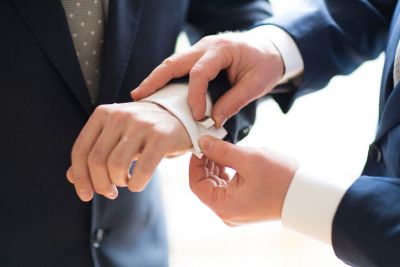 Many matrimonial traditions all over the globe include special roles usually filled by siblings or friends of those getting married. They may occupy an honorary spot in wedding processions and even aid their comrades or relatives in preparations during the months leading up to the big event. In Western ceremonies, these honor attendants fulfill many important duties and provide both moral and visible support when their loved ones are at the altar. If you’ve been asked to be an honor attendant, you should know some vital information about how you can help your friend or relative get ready to walk down the aisle.
Many matrimonial traditions all over the globe include special roles usually filled by siblings or friends of those getting married. They may occupy an honorary spot in wedding processions and even aid their comrades or relatives in preparations during the months leading up to the big event. In Western ceremonies, these honor attendants fulfill many important duties and provide both moral and visible support when their loved ones are at the altar. If you’ve been asked to be an honor attendant, you should know some vital information about how you can help your friend or relative get ready to walk down the aisle.
Best Man, Maid of Honor or Honor Attendant?
The terms “best man” and “maid of honor” come to us from traditions centered around heterosexual nuptials. Generally, the best man has been a close friend or relative of the groom while a bride has chosen her maid of honor from among her sisters and BFFs. Loosened gender norms have begun changing the landscape for weddings, with some grooms opting for a best woman and brides sometimes picking a man of honor. These developments, along with the advent of same-sex marriage and increased visibility for nonbinary, genderqueer and agender individuals, have prompted some couples to select gender-neutral terms for these roles. The most common alternative to “best man” and “maid of honor” is “honor attendant.”
How Does an Honor Attendant Help Before the Wedding?
Duties for honor attendants have usually been gender-based and assigned to their customary designations. The Knot breaks down typical best man responsibilities in detail on its own website while also offering an exhaustive list for the maid of honor role. If you’re looking for a combined list for your own planning, the etiquette mavens at the Emily Post Institute provide one on their own site. Their version includes information for all the attendants you’ll find in a traditional wedding party. Honor attendants assist with many kinds of pre-nuptial prep:
- Helping select attire for the person getting married
- Organizing gift-giving efforts with other wedding attendants
- Arranging any pre-wedding parties
- Ensuring that other attendants obtain and are fitted for their attire
Besides these essentials, an honor attendant might help with smaller tasks such as addressing and shipping wedding invitations and labeling place cards for the reception.
Vital Duties on the Day of the Ceremony
Once the big day has arrived, honor attendants step up to the plate to supply logistical and emotional support. Depending on what the couple may need, an honor attendant’s wedding-day tasks can include:
- Organizing or providing transportation to venues
- Preparing and delivering payments to wedding vendors
- Confirming that other attendants arrive on time and are properly dressed
- Overseeing the usher’s seating of guests
- Holding wedding rings and bouquets during the ceremony
- Witnessing the signing of the marriage certificate
- Standing in the receiving line to greet guests
- Gathering guests together for dances, cake cutting, bouquet tosses and other events
- Communicating with vendors when needed
- Assisting the newlyweds with changing out of their attire
- Gathering wedding apparel to clean and store away
- Returning rental attire to their original establishments
In addition to all these crucial jobs, an honor attendant may be asked to offer a toast to the new couple. Traditionally, the best man undertakes this honor, but each set of newlyweds can define their own customs and define the honor attendants’ roles as they see fit.
Honor Attendants Help Create a Memorable Day
Just as weddings are personalized celebrations for each couple to declare love and commitment, they’re also social events at which their happiness is shared with family and friends. Whether it’s helping the newlyweds-to-be stay organized, handling vendors or interacting with guests, honor attendants perform a lot of critical duties to make each affair run smoothly.
Add Your Comment